
Check out our new platform 🚀 https://thecapital.io/
If you know Bitcoin, you may also be familiar with the role of miners in the Bitcoin ecosystem. Mining involves the process of solving complex mathematical puzzles, the first to solve, wins the right to add a new block to the blockchain. This mechanism is known as Proof-Of-Work and used to ensure the blockchain ledger includes correct transactions. Since it requires resources (hardware and electricity to run the mining operation), it is expensive.
Proof-Of-Stake protocols on the rise:
Proof-Of-Stake is an alternative to the Proof-Of-Work system. Instead of consuming resources (electricity), Proof-of-Stake requires validators (alternative to miners) to stake protocol’s tokens in the staking wallet in order to engage in proposing the next block or governing the network.
Instead of competing to solve puzzles, validators get randomly selected on the basis of the amount they have staked. Once selected, they reach a consensus on a block to be added to the blockchain.
As the validators ecosystem in PoS protocols expands, so is the competition. Therefore, to increase the chances of selection, validators pool their stake together. A staking pool allows multiple stakeholders (or bagholders) to unite their stakes to increase their chances of earning the block rewards.
The popularity of Staking pools:
Using validator’s staking pools can be attractive to a wide range of crypto users. Users don’t have to worry about managing nodes. All that is needed is to delegate your PoS tokens to a staking pool’s smart contract and continue receiving annual interest. It is as simple as having a bank deposit.
In these staking pools, everything from rewards to risk is shared among the participants of the pool, thereby minimizing the risk for a user. The biggest advantage of this solution is that the users can stake any amount, which allows for wide participation.
For example, users interested in staking NEAR can simply log in to Staking.Dokia.Cloud, select NEAR protocol, pick a pool from the list, delegate voting weight (or deposit assets) to the pool, and start earning rewards. The pools take care of maintaining the node for a commission deducted from the rewards earned during the life of staking.
Here is how Trust wallet users can stake their NEAR tokens.
1. Go to your Trust wallet and copy the NEAR address.
2. Login to https://near.github.io/account-lookup/.
3. Input your NEAR address to get account details. Save the account ID details as we would need it in the later step.
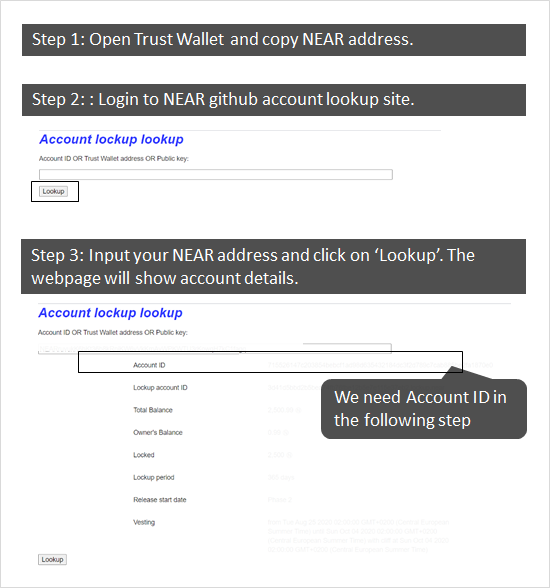
4. Open Staking.Dokia.Cloud
5. Select NEAR protocol from the options available and click Delegate.
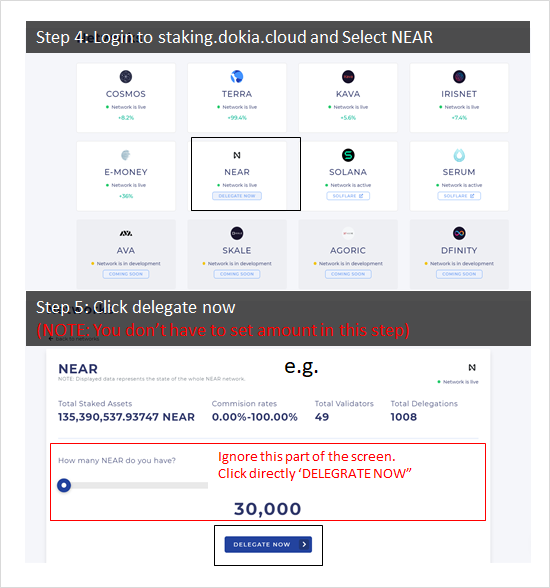
6. The webpage will show all the available staking pools running NEAR nodes, Select one from the list. You can decide based on the commission they charge or how many tokens are already staked in the pool or based on their reputation.
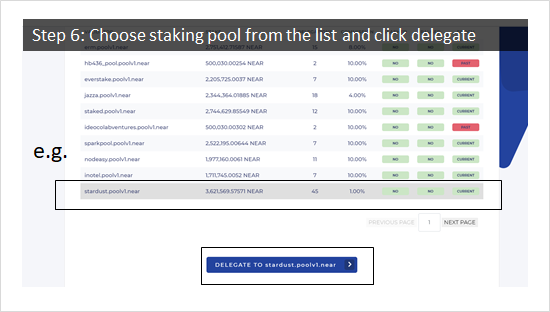
7. The web page will direct you to select a preferred way of authorizing your stakes delegation to the pool.
a) Select ‘Continue to the web interface’.
b) Select Mnemonic as the authorization method and Input mnemonic of your Trust Wallet (the method is completely safe).
c) Input account ID. This is the same information you gathered in step 3.

8. Input the number of NEAR tokens you would like to stake and click next.
9. As a final step, click next and sign the transaction. Once signed, the NEAR tokens that you allocated will be sent to the staking pool’s smart contract.
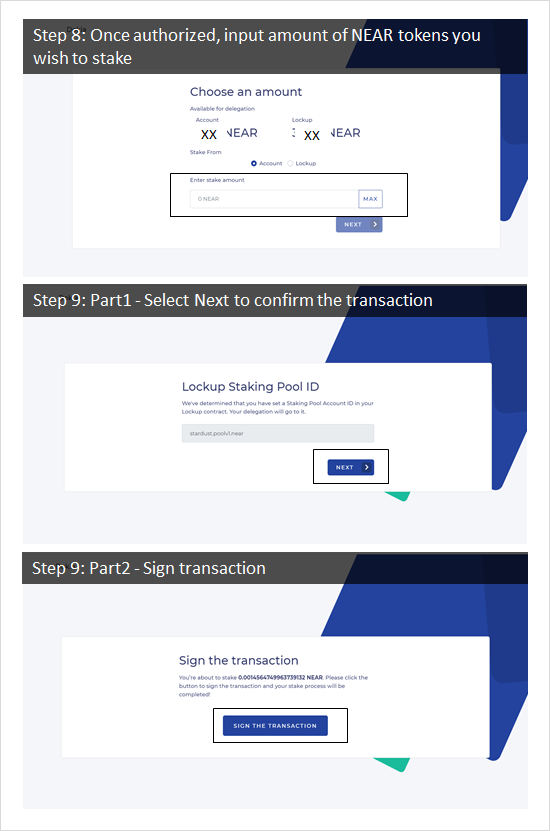
Once finished all the above steps, you are ready to receive annual interest on the amount you staked with the pool. If you wish to remove your stake,
- Go to addresses: https://staking.dokia.cloud/addresses and
- Click on Remove. Once done, your tokens will be back to your Trust Wallet.
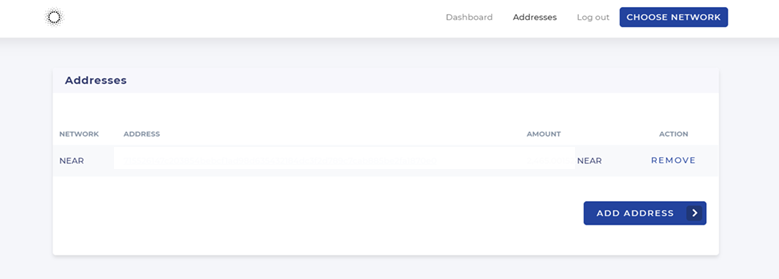
Closing remarks:
A bit of inspiration: As of August 2020, nearly 60% of Proof-Of-Stake protocol’s market capitalization is locked in staking nodes i.e. $16.8 Billion. With the growing number of PoS protocols getting launched and Ethereum migration from PoW to PoS, It’s expected by 2023, this TVL will grow to $75 Billion.
Speaking to one of the validators in the NEAR protocol and operator of Stardust pool, Denysk highlights the -
Current world economic situation wherein the traditional financial institutions are offering zero if not negative interest rates. People are looking for a way out. Staking is one such opportunity to earn passive income from your idle funds.
When asked about why NEAR protocol, he adds -
NEAR is a very new platform with a lot of potentials. It has a huge advantage over ETH and other earlier projects — more stable, fully decentralized and faster network.
NEAR protocol recently launched its main net allowing users to stake their tokens for securing the network and in return get rewards. NEAR Protocol is a sharded, developer-friendly, proof-of-stake scalable-public blockchain. Built from the ground-up keeping developers and users in mind, users experience fast transaction settlement (3-sec block finality) with a 10K x lower gas fee. To know more, read here.
https://twitter.com/thecapital_io
How to stake NEAR with Trust Wallet was originally published in The Capital on Medium, where people are continuing the conversation by highlighting and responding to this story.
from The Capital - Medium https://ift.tt/3j8Ifek
0 Comments